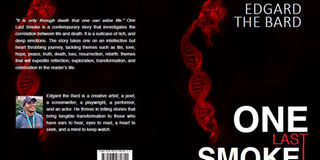Prime
Edgard The Bard’s smoking hot poetry

What you need to know:
- Although written in free verse, it has a fixed patterning on musings, metaphors and rhythmic designs which tacitly agree with T. S. Eliot’s view in “Reflections on Vers Libre,” that no verse that is any good is entirely free.
“One Last Smoke” sounds like a title to a Snoop Dogg song, and it could be. As Edgard the Bard’s poetry collection has the narcotic power of leaving a reader hooked with every line.
Although written in free verse, it has a fixed patterning on musings, metaphors and rhythmic designs which tacitly agree with T. S. Eliot’s view in “Reflections on Vers Libre,” that no verse that is any good is entirely free.
The Prologue of this book sets the tone:
“Having to constantly face the elements,
One has to wonder
Whether man is useful with his time.
Dawn.
A stitch in time saves nine.
Grudgingly, he prepares for his seven to nine.
Unmoved by the horizon’s calling for life anew,
Untainted by the freshness of dawn’s dew.”
With our noses daily to the grindstone, we rarely have time to smell the proverbial roses. Instead, we are trapped in a mouse wheel revolving around work in a manner which turns our realties upside down.
Possibly that is why, in the last line, ‘dawn’s dew’, which is figuratively and literally a cleanser as to its freshness, is revealed as something which taints an otherwise tainted existence. This paradox reveals the tension in the poem as definitive of the tension between the persona’s existence and sense of being ill at ease. In literature, a persona is an invented perspective that a writer or poet uses. Accordingly, Persona poetry has been defined as “poetry that is written from the perspective of a ‘persona’ that a poet creates, who is the speaker of the poem. DramaticMonologues are a type of persona poem, because ‘as they must create a character, necessarily create a persona’.”
Dramatic Monologues are speeches or narratives by an imagined person in which the speaker inadvertently reveals aspects of their character while describing a particular situation or series of events. In the poem, HAPPY LIFE, we witness the persona’s raging against the dying of a light.
“What’s the point?
Who can stop the hour hand from striking midnight?
Bagyenzi!
If silence is what awaits me
Let it be.
It’s what I desperately seek.
Bagyenzi!
Let me breathe.
Life must be happily lived.
Puff puff.”
Where death lurks, the persona seeks life. This contradiction is a sort of Chiasmus as the concepts of sadness and happiness are reversed to place happiness before death instead of sadness. By this token, the persona believes in the futurity of eternity.
This underlines the persona’s faith that what may go up in smoke symbolises our constant striving to reach the heavens.
In many religious traditions, smoke has been used as a means for prayer. It is also viewed as the representation of the immortal souls of the dead or dying rising into heaven and their energy being elevated to a higher plain.
In possibly this anthologies shortest poem, THE AUTHOR, the persona expands on this notion of eternal life:
“He gives
He takes away.
Even then,
It is not the end.”
At the poem’s centre, the active verb “give” and phrasal verb “take away” presuppose the larger picture of God’s plan. The Author is God, as the Author of life.
In the Bible, there are many names given to God. On a purely poetic level, these many names serve as images and thus place this poem in the poetic genre of “Imagism.”
The father of Imagism Ezra Pound defined it as “that which presents an intellectual and emotional complex in an instant of time.” The image of The Author, in an instant of time, thus brings together two worlds: this one (the one He gives and takes away) and the next (it is not the end).
As Pound also said, literature does not exist in a vacuum. Writers as such have a definite social function exactly proportional to their ability as writers. This is their main use. This social function is exhibited in painterly verse by Edgard in such a way as to help one relax with its vibrant tonal wording splashed on life’s grey canvas to enliven each moment with colourful poetry. Edgard’s poetry is written in soaringly melodious tones which often border on hymnal verse form. In the spirit of loss leading to gain, this book is a winner for everyone. Especially those persons who see in the cleansing force of poetry words and images which wash with their aspirational living.
Title
One Last Smoke
Author
Edgard The Bard
Where:
Most bookshops in Kampala.




